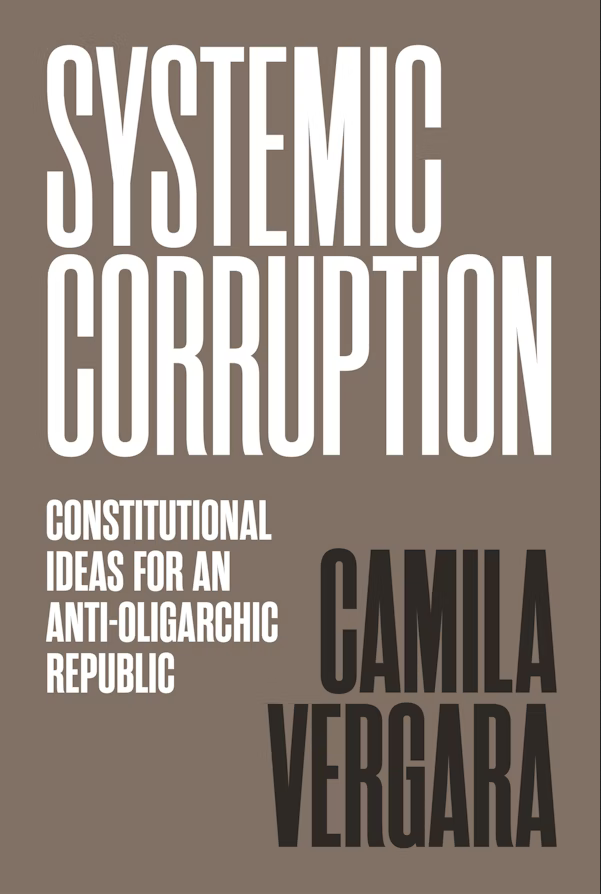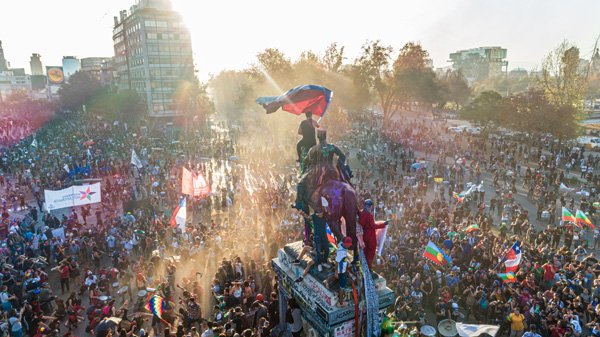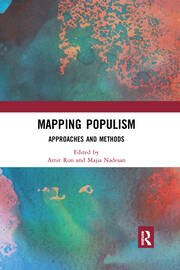Missed Opportunity
Chile got a chance to rewrite its constitution and remake its past. The past won.
Read
Two years ago, on the heels of mass protests, Chileans overwhelmingly agreed: they needed to draft a new constitution. This September, faced with an up-or-down referendum on one of the most progressive governing charters in world history, they balked. What went wrong? Political theorist Camila Vergara breaks down the breakdown in her country’s efforts to scrap a political framework dating back to the ruthless dictatorship of Augusto Pinochet, who took power in 1973 in a U.S.-backed coup.
Vergara joins Will and Siva to discuss this failure to overcome the stranglehold of Pinochet’s neoliberal ideology and rewrite his legacy of violence, disappearances and austerity politics. She identifies several key phenomena that poisoned the process — among them, a traditional media system controlled by right-wing factions and a decision to make voting on the new constitution mandatory, with financial penalties for citizens who didn’t follow through. Another problem, Vergara says, was that leftist President Gabriel Boric failed to mobilize support, while his administration — and Chile’s political class in general — saw its approval ratings dwindle.
Meet
Camila Vergara González is a Marie Skłodowska-Curie Fellow and postdoctoral scholar at the University of Cambridge. She is a Chilean political theorist, journalist and historian who specializes in anti-oligarchic thought and plebeian constitutional rights. Her book Systemic Corruption: Constitutional Ideas for an Anti-Oligarchic Republic (Princeton University Press, 2020) considers why modern democracies have failed to prevent the consolidation of wealth among the privileged few, and what community-based efforts can do to wrest back power for the people. Follow Vergara on Twitter @Camila_Vergara.
Systemic Corruption is based on Vergara’s dissertation. It shows how the descent of modern democracies into oligarchy was presaged, thousands of years ago, by classical philosophers.
She recently republished a revised version of that work, designed as a practical guide for Chilean activists. This Spanish-language edition is called República plebeya, and is available online for free.
Vergara writes frequently on political issues in Chile for the New Left Review. In October 2019, she described the street protests in her country as a “rebellion of the plebeian classes” against the legacy of Pinochet.
Earlier this year, she considered the proposed constitution’s contents in the context of historical injustices. And in the wake of September’s failed plebiscite, she lamented how Pinochet’s shadow continues to loom large.
U.S. politics is on Vergara’s radar as well. In a book review for the Boston Review, she agreed with author Patrick Boucheron that America finds itself in a “Machiavellian moment,” in which faith in institutions is eroding. Sounds like a familiar argument!
She is an editor of the 2017 volume Machiavelli on Liberty and Conflict, which reconsiders Machiavelli’s thought on the pragmatic uses of power in a contemporary light.
In a recent scholarly article, Vergara proposes an approach to constitutionalism that goes beyond abstract political philosophy, taking material conditions into account when building new frameworks for governance.
The story of the revolutionary thinker Rosa Luxemburg offers an instructive case to think through, Vergara writes. Reflecting on the failures of social movements in early 20th-century Russia and Germany, Luxembourg was a proponent of local councils as a check on representative government at the state level.
In a chapter of Mapping Populism, Vergara argues that a populist leader, when acting in the economic interests of the masses, can provide a corrective to the oligarchic tendencies of liberal democracies.
Learn
The nonprofit North American Congress on Latin America has devoted its whole Winter 2022 issue to the aftermath of the Sept. 5 vote in Chile, including an essay by sociologist René Rojas, who sees reason for hope.
Download and read (in Spanish) Chile’s proposed, but rejected, constitution for yourself — all 388 articles of it.
Or, for the short version, read this explainer from Reuters. The failed charter would have expanded the welfare state and civil liberties, imposed term limits on presidents and enhanced rights for indigenous groups.
Among other native groups, the Mapuche people, after centuries fighting oppression, were looking to gain substantial autonomy, including control over their land and their own courts. For now, they’ll have to wait.
The nod for rewriting Chile’s constitution passed with 78 percent of the vote in October 2020. But fewer than two fifths of voters liked what they got from the process. Lautaro Cella and Eli Rau analyze this conundrum in a column for the Washington Post. Like Vergara, they take issue with the compulsory voting policy adopted for the second referendum.
NPR spoke with Chileans across the political spectrum after they turned down their would-be constitution. One said she was pro-reform yet felt the document as drafted “didn’t represent us.”
Like Vergara, policy expert María Carrasco was dismayed with the defeat of the new constitution. Carrasco notes that 89 percent of private donations in the campaign went to the “reject” camp. Social movements for better education, protecting natural resources and defending women’s rights, she writes, did not translate into broad support among the wealthy, where conservative values remain deeply entrenched.
One scholar with the Carnegie Endowment for International Peace has a different view. Oliver Stuenkel calls the constitutional rejection a sign of Chile’s “democratic maturity,” saying voters expressed a desire for moderation, not radical change.
George Washington University’s National Security Archive details declassified documents from the 1970s showing how President Nixon’s CIA worked to destabilize the democratically elected government of Chilean leader Salvador Allende. Allende died in the Sept. 11, 1973, coup d’état that brought Pinochet to power.
WBRU’s On Point recently asked what Americans have to learn from that debacle five decades ago. The state of affairs at the time in Chile — rife with inequality, polarization and violence — resonates with many of the issues Americans have been facing.
We’ve been talking a lot this season about legal reform in the United States, with guests like Jed Purdy and Chris Sprigman.
But if nothing else, Chile’s story reminds us it’s hard to amend any constitution these days, let alone rewrite one. One major obstacle for Americans is their country's long history of racism, writes lawyer Jesús A. Rodríguez.
There were clashes between police and peaceful protestors in the streets of Santiago again last month, on the anniversary of the 2019 protests in which 30 people died. Human rights groups raised questions about the crackdown by authorities; so did President Boric — while also calling for “public order.” Aljazeera has a gallery of photos from these latest skirmishes.












